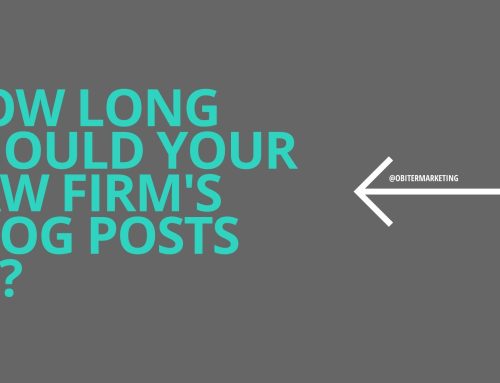Transparency: We used an outsourced third party to draft this blog post. It does not reflect our writing style and we did not invest the time to make significant edits to it. Our small team prefers to prioritize writing for our clients and can’t always make time to cover these important topics. So, please ignore any grammatical errors, long sentences, or off-brand phrasing – it’s not a reflection of our work or editing processes, it’s a reflection of the limited time we resources we had available at the time of publication.
Domain authority (DA) can be used by lawyers and law firms to study and evaluate digital strategies. But why does this metric matter, and how can companies improve it? A higher DA might help your law firm rank better on Google.
Defining Domain Authority
The domain authority (DA) metric was developed by Moz, an SEO solutions company, to predict a domain’s chance of appearing in a search engine’s results. Domain authority is not one of the ranking factors used by Google to rank websites. In other words, it isn’t a metric that results in higher rankings in search engines. A domain authority can, however, be a helpful indicator for assessing your website’s performance compared to your competitors.
Moz isn’t the only company that uses this metric nowadays. SEMrush, for example, has developed its authority metric that evaluates backlinks, referring domains, and search traffic for its authority score. This metric is useful for knowing how your site compares to competitors.
Domain Authority Score
Based on Moz’s domain authority score, which ranges from 1 to 100, higher numbers indicate better search engine results page (SERP) results. A site’s quality and quantity of backlinks are considered by the SEO tool when defining this metric.
What Is a Backlink?
A backlink is a link from another website to your site. A good backlink is from a site with high credibility with Google. Your website receives SEO benefits from the external site by linking to it. When other quality websites link to your content as a reference, Google sees that your site is authoritative. It serves the same purpose as a digital footnote.
An article with backlinks from high authority pages, such as Wikipedia, Google, or government pages, will have a greater chance of being ranked higher. Different industries and websites will receive more backlinks, and some will be more valuable than others based on their characteristics. A lawyer’s firm might seek links from national newspapers, academic articles, or government websites, for instance. The backlinks from local businesses’ websites, on the other hand, are more valuable to their target market, regardless of their domain authority, since they are more relevant to their market.
Domain Authority vs. Page Authority
Domain authority measures whether or not an entire web domain (an actual presence on the Internet, such as a web page) will rank in the SERPs. Meanwhile, page authority considers the likelihood of ranking each website page. You can analyze which pages may need some fine-tuning to achieve a higher score by analyzing the performance of each page, such as a blog post or services page. Thus, with the page authority indicator, you can identify the pages with the most potential for improvement within your digital strategy and determine which actions to take next.
How To Check Your Law Firm’s DA
Moz’s Free Domain Authority Checker lets you check your website’s DA (for free). The Domain Authority score of your webpage is automatically displayed when you enter your domain’s root URL (e.g. obitermarketing.com). Also included in the digital tool are metrics such as:
- Linking Domains: How many unique external linking domains are linked to each page
- Inbound Links: How many unique pages link to each page, and
- Ranking Keywords: How many keywords are ranked within the top 50 positions for this website
Do not panic if your domain authority isn’t very high, since most law firm websites fall between 0 and 60.
It is not unusual to see domain authority scores in the low to mid-50s even for some of the largest, most established law firms in the country.
You can gain a significant amount of traffic with a DA of 15 to 25. This is because domain authority is scored on a logarithmic scale rather than a linear scale.
Building Domain Authority for Your Law Firm
Now, let’s get practical: how can you build domain authority and rank higher than your competitors?
Google stresses that it isn’t just about the number of links to your website or the number of domain links, but also about how relevant those links are to your website’s content. The following tips will help you build Domain Authority:
- Posting quality content: Backlinks that are relevant should be prioritized over those that aren’t. Getting natural backlinks is easier when you write quality content.
- Develop content that is appealing to your core audience and likely to go viral.
- Update older content: Add new information of interest to those pages with unindexed pages or with low page authority scores.
- Identify your competitors and do an analysis: Increase your website’s visibility by analyzing what you are doing and what you are not doing.
- Promote your web content on social media or through newsletters in a unique and original manner.
- Create subpages to make your website bigger.
It takes time and effort to build your Domain Authority; you won’t see results immediately. By following these practices, you will be able to improve your website’s visibility on SERPs, which in turn will lead to an increase in traffic to it.
How to Improve Domain Authority for your Law Firm
When it comes to improving Domain Authority for your law firm, quality matters over quantity. First and foremost, you should conduct a website analysis to know what works and what doesn’t.
Generate quality content
Domain authority starts at 1 for a new website. Your domain authority should grow over time if you practice ethical SEO. Ideally, this should be done gradually.
If your domain authority is consistently rising, and you avoid unethical practices, a law firm SEO strategy will be successful for the long run. Factors such as the number of people visiting or leaving your website, as well as engaging with it, can all determine your law firm’s website performance. It can even positively impact it as well. Producing better content is one way to improve upon all these factors. An analysis of previously published content, especially the best performing pieces, can be fruitful in determining your strategy.
Keep a benchmark
The question of what makes a domain authority “good” is one that is asked by many law firms. This is a relative concept. One of the first things we do when working with a new firm is to evaluate its competitors.
Are your target keywords ranking well on law firm websites? Chrome’s MozBar extension lets you view a website’s domain authority, so understanding your competitors’ DA is important. Your market competition benchmark will be determined by this.
In addition to links, Google uses many other factors in its ranking process. With a domain authority of 10 and an average score of 60 for local competitors, it is difficult to outrank your competitors.
Improve backlinks
Your company’s website domain is largely influenced by link building. This means the number of backlinks you are getting. Some ways to improve it are already mentioned above, such as improving the quality of your content. It’s also a good idea to conduct a competitor analysis. Analyze your competitor’s website for what they are doing as part of their marketing strategy. Take a look at their content and website design, and try to improve upon it for your own law firm’s website. This will increase your chances of getting a backlink. It is also possible to do this through manual outreach. This means you can find websites with higher DA scores, and reach out to them for guest posts.
Backlink opportunities
It is also possible to determine the benefit of a link from any website for your law firm by using domain authority. As an example, let’s suppose your state bar association features your website in an online article. The fact that it’s a very relevant source doesn’t require a metric to help you understand its value. Consider the situation where you are a personal injury attorney and a parenting blogger requests to work together on a child safety blog. For an assessment of whether this is an opportunity worth pursuing, you can check the blog’s domain authority and backlink profile.
If you are considering link opportunities for your firm’s website, keep several factors in mind. You should trust your intuition, but you should also look at domain authority and other link metrics for guidance. If you’re a law firm looking to promote your SEO, a link from a shoe store with a high domain authority isn’t likely to help you. You don’t need a high domain authority website if it isn’t relevant to your business. You may still benefit from working with a local blogger if they have a local audience that your law firm wants to reach, even if their website doesn’t have a high domain authority.
Importance of Domain Authority for your Law Firm’s Website
There is no doubt that links play a crucial role in ranking. Your firm’s website’s links are evaluated by Google’s algorithm. You may appear higher in search results if highly reputable websites link to your content, since this signals to Google that you have valuable content. A backlink profile is the list of links that point to the website of your firm from other websites. A strong backlink profile increases your chances of ranking well in organic search. Hence, the domain authority of your law firm should be improved continuously.
SEOs often resort to spammy practices (known as “black hat” SEO) as a means to increase their backlink profile. Often, law firm websites try to gain higher rankings by exploiting the system. Link metrics, such as domain authority, are designed to reflect Google’s link policy, which emphasizes quality over quantity. The more links you have from lower-quality websites, the worse your SEO will be, and in many cases, your rankings will actually suffer.
Read more about black hat SEO and Google’s attitude towards it.
Backlink Strategies for Law Firms
Your authority is determined by the quality of the websites in your backlink profile, which is measured by tools such as Moz. There will be a difference in authority between a law firm website with 100 links from directories or spammy sites, and a law firm website with 50 links from relevant, high-quality websites such as legal publications, news stories, or bar association sites.
The practice of selling backlinks is common among marketing companies. Suppose, for example, you receive an email promising 10 backlinks from sites with a domain authority of 50+ in exchange for a certain amount of money. Doesn’t that sound great?
However, a penalty can be imposed by Google if you pay for link-building. Law firms should focus on content development that naturally earns links from reputable and relevant websites when link-building. As part of your reputation-building strategy, you should also provide sources to reporters who are writing news stories about relevant legal topics for your law firm. Your website will typically be linked to if you are a source.
Improve Your Website’s Search Visibility with Obiter Marketing
We help law firms write on-brand content






